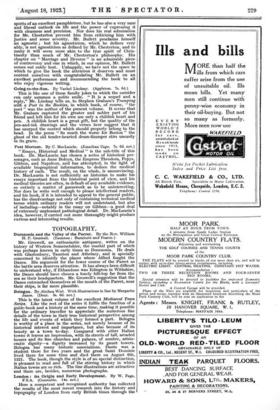BOOKS AND WRITERS.
The Innocence of G. K. Chesterton. By Gerald Bullett. (Cecil Palmer. 7a. tid. net.)
The worst thing to be said of Mr. Gerald Bullett's study of Mr. Chesterton is that, as he himself admits, it begins by imitating a part of the technical apparatus—and that the worst part—of its subject. We found ourselves at the outset being rapidly prejudiced against Mr. Bullett by sparkles of pure Chestertonese such as this : " To Mr. Blank, Chesterton's theological jokes are intolerable. To joke about sex is well enough, when the ladies have left the table, but to joke about sects is in bad taste." . Happily, our prejudice soon dissolved, not only because Mr. Bullett does not persevere in this sort of thing, but, still more, because his book proves to be a very spirited and a very entertaining tilting-match. Mr. Bullett is well equipped—surprisingly well equipped for so young a man--rforhis task, for not only does he possess, like Mr. Shaw and Mr. Chesterton, the briskness, agility, and high, spirits of an excellent pamphleteer, but he has also a very sane and liberal outlook on life and the power of expressing it with clearness and precision. Nor does his real admiration for Mr. Chesterton prevent him from criticizing him with justice and some severity. Mr. Bullett proclaims himself an agnostic ; but his agnosticism, which he defines very ably, is not agnosticism as defined by Mr. Chesterton, and to many it will seem more akin to the true spirit of Christianity than much of Mr. Chesterton's philosophy. His chapter on " Marriage and Divorce " is an admirable piece of controversy and one in which, in our opinion, Mr. Bullett comes out easily best. Unhappily, we have not the space in which to give the book the attention it deserves and must content ourselves with congratulating Mr. Bullett on an excellent performance and recommending the book to all who enjoy vigorous writing.
Going-to-the-Sun. By Vachel Lindsay. (Appleton. 7s. Gd.) This is like one of those family jokes to which the outsider can only summon a polite smile. " It is a sequel and a reply," Mr. Lindsay tells us, to Stephen Graham's Tramping with a Poet in the Rockies, in which book, of course, " the poet " was the author of the present volume. It seems that Mr. Graham captured the greater and nobler part of his friend and left him for his own use only a childish heart and pen. A childish heart is a great gift, but the quality of the pen-and-ink drawings and the verses here suggest that it has usurped the control which should properly belong to the head. In the poem " So much the worse for Boston " the ghost of the old tender-hearted drum-thumper stirs uneasily in its grave.
Post Mortem. By C. MacLaurin. (Jonathan Cape. 7s. Gd. net.) " Essays, Historical and Medical " is the sub-title of this book. Dr. MacLaurin has chosen a series of historical personages, such as Anne Boleyn, the Empress Theodora, Pepys, Gibbon, and Napoleon, and has attempted, in the light of available biographical information, to deduce the medical history of each. The result, on the whole, is unconvincing. Dr. MacLaurin is not sufficiently an historian to make his essays important from the historical point of view, and his medical theories are often, in default of any available evidence, so entirely a matter of guesswork as to be uninteresting. Nor does he write well enough to please intellectual readers, and his book, if it is intended to appeal to the general public, has the disadvantage not only of containing technical medical terms which ordinary readers will not understand, but also of including—notably in the essay on Gibbon—a good deal of extremely unpleasant pathological detail. Dr. MacLaurin's idea, however, if carried out more thoroughly might produce curious and interesting results.



































 Previous page
Previous page